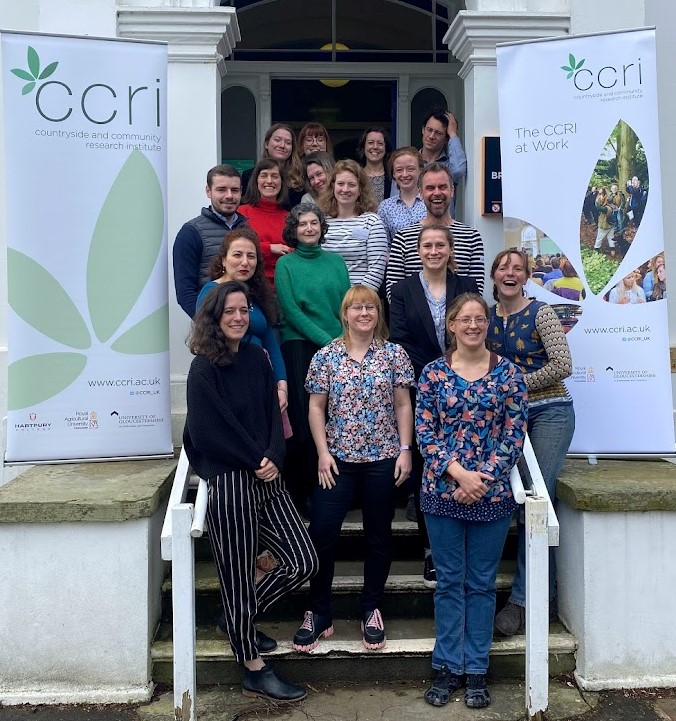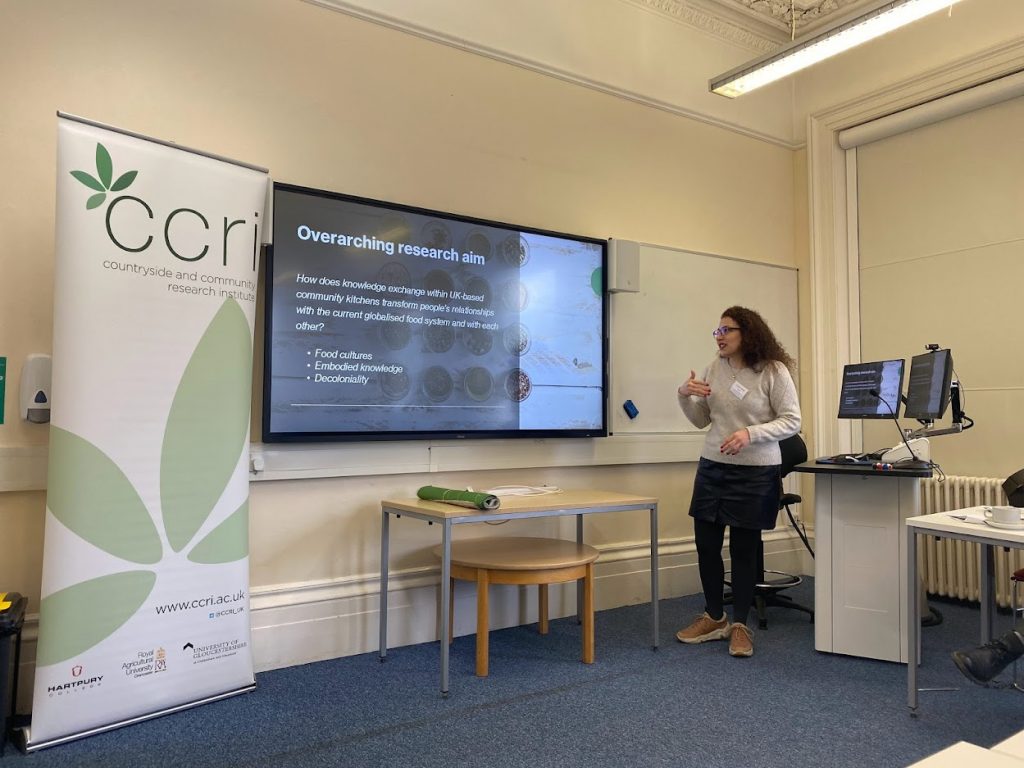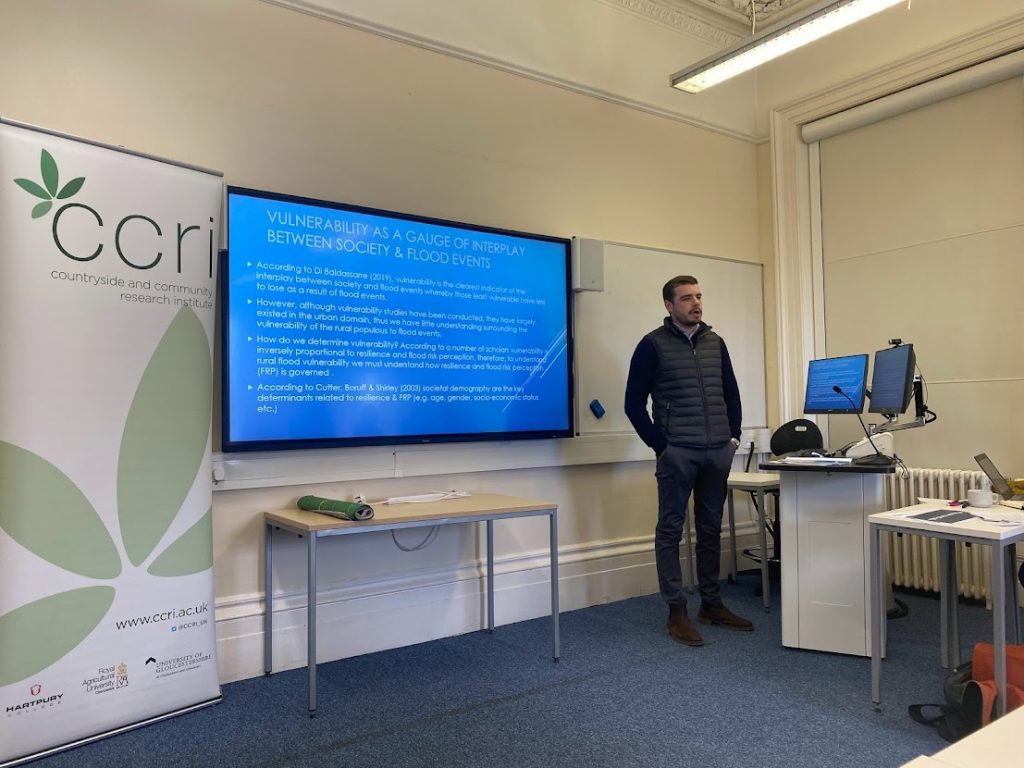The Countryside and Community Research Institute’s annual Winter School took place on March 3rd and 4th. In this post, we hear from two attendees who received travel bursaries from the RGRG.

Lamis Jamil, Centre for Agroecology, Water and Resilience, Coventry University.
I joined the CCRI Winter School 2022 “Crossing Boundaries” at a key turning point in my PhD journey. I had the pleasure of meeting a wide range of wonderful people, from those who were on student placements to PhD researchers, ECRs, research fellows, professors as well as practitioners. I particularly appreciated that the session presentations went beyond food and farming systems into animal welfare, culture, environmental governance, health and diet, sports, fine arts and even disaster risk management. In a way they “crossed boundaries” of the perceived binaries of urban/rural, human/more-than-human, the researcher/the practitioner and created a flow that highlighted the inter-dependency of all disciplines. This was especially evident in the workshops that were dotted into the programme on life after PhD and on transdisciplinary methods, which helped me to paint the bigger picture of how research can contribute to impact in society.
With that being said, I became aware of an important knowledge gap on the need for acknowledging and advancing new frameworks and methodologies for transdisciplinary work. I noticed this was pressing not only within academic research but also in practice. Knowledge co-production necessitates collaboration and partnership, which is often difficult to achieve within a time-constrained, inherently solitary PhD. However, I realised this remains to be a challenge even after a PhD where people from different disciplines (and cultures) try to work together and make governance decisions which will inevitably influence whose knowledge becomes valued over and above another, even when trying to co-produce research. More work is needed to find ways to bridge this gap.
This was my first in-person event in a very long time! It was an immersive and engaging time that, in terms of my PhD, has put me on a good trajectory for at least the next six months. It has also helped me to expand my network. I commend all the efforts of the CCRI Team, especially Aimee Morse and Dan Keech, for making this experience so welcoming, warm and fruitful. Looking forward to the 2023 CCRI Winter School!

Daniel Jones, University of Chester.
As a relatively new PhD student I had not previously attended an event with other PhD students, thus I was somewhat apprehensive with regard to what such an event would involve and whether or not I would be able to make a valid contribution to the proceedings. However, on arrival to Park Campus I was immediately made to feel very welcome by Dan, Aimee and other CCRI staff members who went above and beyond to make everyone feel comfortable in what felt to be a very supportive environment.
A key issue I have noticed since starting a PhD is the fact that you become all consumed in your own field of study, thus you become rather isolated within your own discipline. However, inter/trans-disciplinarity was a key concept of the CCRI Winter School and one of the best parts of the event was the fact that you are exposed to disciplines you were previously unaware of. I found this has given me a number of ideas for my own area of investigation which I otherwise would not have had, thus demonstrating the benefits of this trans-disciplinary focus. Although the talks of fellow students were extremely interesting, I found another key aspect of the winter school to be the workshops held by CCRI members in which they passed on their advice from past experiences to us which gave me a number of tips for when I begin my own research.
When it came to my turn to present, I was very nervous owing to the fact that I have not done anything like this before, I was worried that the early stage of my research would render my presentation to be not overly useful for other members, but I was overwhelmed with the response I had. Several attendees offered me advice, support and also shared how they dealt with issues that I may face over the course of my research, all invaluable things that if I had not of attended the winter school would not have been afforded to me. Therefore, I cannot thank CCRI staff members and winter school attendees enough. The experience was absolutely fantastic, and I have been fortunate enough to make a number of contacts who I am sure I will keep in touch with in the future. It feels as though I now have another layer of support who I can turn to should I need advice.
I would highly recommend this event to PhD students in a relevant field. It was organised impeccably; you were made to feel welcome and supported and most of all I feel as if I can approach the CCRI and other attendees any time for advice/support if needed.

You can catch up on the event by searching #CCRIWS22 on Twitter. For more news from the CCRI, and for more details on the application process for next year’s Winter School (window opens October 2022), follow @CCRI_UK.